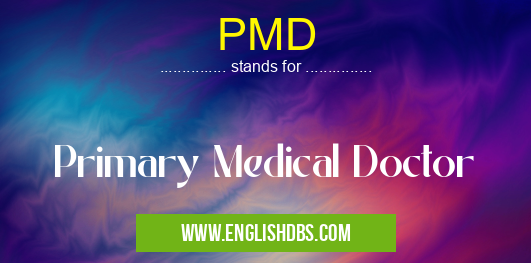What does PMD mean in MEDICAL
We live in a world filled with acronyms, and the medical field is certainly no exception. One of the most common terms used in the field is PMD, which stands for Primary Medical Doctor. Knowing the meaning of this term can help you better understand how healthcare works and how to get the best care possible. In this article, we'll explain what PMD means in medical terminology and why it's important to know.

PMD meaning in Medical in Medical
PMD mostly used in an acronym Medical in Category Medical that means Primary Medical Doctor
Shorthand: PMD,
Full Form: Primary Medical Doctor
For more information of "Primary Medical Doctor", see the section below.
Essential Questions and Answers on Primary Medical Doctor in "MEDICAL»MEDICAL"
What is a Primary Medical Doctor?
A primary medical doctor, also known as a primary care provider, is a health care professional who provides general medical care to patients. They are trained to diagnose and treat a wide variety of illnesses, injuries, and other medical conditions. Primary care physicians also provide preventative health services, such as immunizations and routine physical assessments.
What services do Primary Medical Doctors provide?
Primary medical doctors provide comprehensive medical services including preventive health exams; treatment of illness and injury; non-surgical consultation; ordering lab tests; prescription writing; referral to specialists; counseling on exercise, nutrition, and lifestyle changes; management of chronic conditions like diabetes or asthma; and coordination of other healthcare services or treatments.
Can I see my Primary Medical Doctor for a second opinion?
Yes. Your primary care physician can help you determine if you need a second opinion from another specialist about your diagnosis or treatment plan. Your primary doctor may speak with the specialist on your behalf to receive an informed opinion without requiring any additional visits by you.
Does seeing a Primary Medical Doctor cost money?
Generally speaking, yes. Most primary care physicians require payment in the form of out-of-pocket fees or co-payments for their services. Insurance providers may cover some or all of the costs depending on your insurance plan and the specific services being rendered by your doctor.
Is it important to visit my Primary Medical Doctor regularly?
Yes, regular visits with your primary doctor can help maintain good health and identify potential health issues before they become bigger problems down the road. Regular checkups are also key in managing chronic conditions like diabetes or hypertension and keeping up with recommended vaccinations for yourself and your family members.
Do I really need to go to my Primary Medical Doctor when I'm sick?
It’s always best to seek professional medical advice when you’re feeling under the weather instead of self-diagnosing online or relying solely on over-the-counter medications that won't necessarily address the cause of your illness. Your primary care physician will be able to evaluate your condition more accurately before making treatment recommendations tailored specifically for you.
How often should I see my Primary Medical Doctor?
How often you should see yourprimary doctor depends largely on ageand overall health status since children have different needs than adults as do those in good health compared with those with chronic illnesses or other special concerns such as pregnancy. Generally speaking however, annual wellness appointments are recommended for everyone 12 years old and up.
Final Words:
In conclusion, understanding what PMD stands for in medical terms is essential if you want to get the best possible healthcare from your primary care physician. Knowing what this acronym means can help ensure that you are seeing a doctor who has the qualifications necessary to provide comprehensive services tailored to your individual needs and can effectively communicate with other health professionals on your behalf.
PMD also stands for: |
|
| All stands for PMD |
